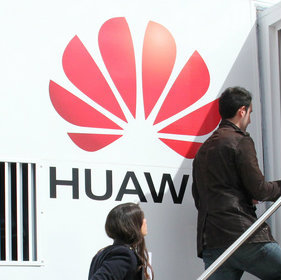
Huawei said it has now shipped more than 10,000 5G basestations to operators in Europe, the Middle East and South Korea in a sign of momentum for the next-generation technology and its biggest supplier.
Ken Hu, the Chinese vendor's rotating chairman, cited the figure as a "new milestone" for the 5G standard. "Commercial deployment is starting in the UK, [South] Korea and the Middle East," he told attendees at Huawei's Global MBB Forum in London today. "Large-scale shipments have already begun and we've shipped more than 10,000 5G basestations to Europe, the Middle East and [South] Korea."
While Hu did not disclose details of customer engagements, Huawei Technologies Co. Ltd. earlier this year struck a 5G radio access networks (RAN) deal with Three UK, which has previously used Nokia as a 3G RAN vendor and Samsung Electronics Co. Ltd. (Korea: SEC) as a 4G supplier. (See Nokia, Samsung Miss Out as Three UK Gives 5G Job to Huawei.)
Huawei is further understood to be supplying 5G equipment to UK telecom incumbent BT Group plc (NYSE: BT; London: BTA), whose mobile subsidiary EE has a long-standing 4G deal in place with the Chinese company.
South Korea's LG U+ was also recently confirmed as one of Huawei's early 5G customers after Huawei had missed out on landing a 5G deal with rival South Korean operator SK Telecom. Like BT, LG U+ has previously relied on Huawei as a 4G supplier, while SK Telecom (Nasdaq: SKM) has not. (See No 5G Deal: Huawei Misses Out at SKT.)
Hu said 154 carriers in 66 countries are now testing or carrying out field trials of 5G technology.
The update from one of Huawei's top executives puts pressure on rival equipment makers Ericsson AB (Nasdaq: ERIC) and Nokia Corp. (NYSE: NOK), which continue to lag Huawei in the market for RAN equipment, according to recent data published by market research firm Dell'Oro. One analyst from another firm said the figure of 10,000 5G basestation shipments was more than he had expected at this stage. (See ZTE, Samsung Battle for Wireless Market Share.)
Italian operator Wind Tre last week estimated it would need about 21,000 5G sites to cover the whole of Italy, while Germany's Deutsche Telekom AG (NYSE: DT) said in October that a 5G network providing ubiquitous coverage in Germany would comprise about 50,000 sites. (See Deutsche Telekom targets 99% 5G coverage in Germany by 2025.)
The news on equipment sales outside China comes despite reports of a growing backlash against Huawei in some Western countries, where politicians have cited the links between Huawei and the Chinese government as a cause for concern.
Arguing that equipment from Huawei and smaller Chinese rival ZTE Corp. (Shenzhen: 000063; Hong Kong: 0763) could be used as a "backdoor" for Chinese spies, authorities in the US have warned service providers off using either vendor. Australia, meanwhile, has banned Huawei and ZTE from participating in 5G tenders. (See Australia Excludes Huawei, ZTE From 5G Rollouts.)
Want to know more about 5G? Check out our dedicated 5G content channel here on
Light Reading.
Huawei is under scrutiny in European markets, too. Last week, Germany was reportedly considering a ban on Huawei equipment in 5G networks. Just a week prior, UK government officials wrote to service providers urging caution in their choice of 5G vendor. Several analysts say security concerns about Chinese vendors motivated officials to send the letter. (See UK Govt Warns Telcos on Choice of 5G Vendors.)
Representatives from Huawei deny the UK letter reflects any specific anxiety about their business. They say there is simply more concern about security in 5G than older networks because 5G will be used to connect mission-critical applications and provide connectivity for industrial equipment and machines as well as smartphones.
Bengt Nordström, the CEO of analyst firm Northstream, says further restrictions on Huawei could hit the entire industry. "If this is leading to difficulties for Huawei to sell in Western countries that will, of course, have negative consequences for the sector as a whole because the Chinese government may respond," he told Light Reading on the sidelines of the Huawei event.
Restrictions could also lead to considerable disruption for operators in the German and UK markets. Just as BT has relied heavily on Huawei in the 4G market, and for technology used in its fixed-line broadband networks, so German incumbent Deutsche Telekom counts the Chinese vendor as one of its biggest suppliers. (See DT Ditches Nokia From Its German Radio Access Network.)
Huawei is one of two RAN vendors that Deutsche Telekom uses in Germany -- the other being Ericsson -- and it has also been carrying out 5G trials with the German operator in Berlin.
"The first antenna was installed in May and [the collaboration] has now expanded to 24 sites," said Alex Choi, Deutsche Telekom's head of technology, during a presentation at Huawei's event. "The joint project builds on a long collaboration between Deutsche Telekom and Huawei."
Swiss operator Sunrise Communications AG also appears firmly committed to a 5G network deployment in partnership with Huawei. Olaf Swantee, the operator's CEO, says his goal is to replace most copper-based broadband connections with a 5G service using equipment developed by Huawei.
— Iain Morris, International Editor, Light Reading
About the Author(s)
You May Also Like



.jpg?width=300&auto=webp&quality=80&disable=upscale)








